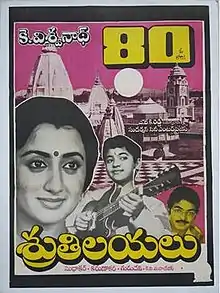Sruthilayalu
Sruthilayalu is a 1987 Telugu-language musical drama film, directed by K. Viswanath. The film stars Rajasekhar and Sumalatha[1] with soundtrack composed by K. V. Mahadevan.[2] The film garnered Nandi Awards for Best feature film; Best direction, and a Filmfare Award for Best Director – Telugu. The film was premiered at the International Film Festival of India, and AISFM Film Festival.[3] The film was dubbed in Tamil as Isaikku Oru Koil.[4]
| Sruthilayalu | |
|---|---|
 | |
| Directed by | K. Viswanath |
| Produced by | Karunakar Sudhakar |
| Written by | K. Viswanath |
| Starring | Rajasekhar Sumalatha Shanmukha Srinivas Jayalalita Naresh |
| Music by | K. V. Mahadevan |
| Cinematography | Subba Rao G.V |
Release date |
|
| Country | India |
| Language | Telugu |
Plot
The film revolves around the role of Naidu (Kaikala Satyanarayana), a Carnatic musician and elder son Narayana Murthy (played by Rajasekhar) who starts getting recognized in the world because of the music learned from Naidu and leaves everyone to fall into the worldly pleasures, forgetting his base roots. It is now the duty of Sita, the daughter-in-law of Naidu (wife of Narayana Murthy) to bring these souls on track.
The film starts with Mr. Naidu (Satyanarayana), a great fan of music and traditional Indian fine arts. He wants his only son to become a great musician, but unfortunately he loses his son in a car accident.
Then he adopts three orphaned street children and teaches them carnatic music so they can make his dream of building and starting an academy of fine arts come true. Sita is also a fan of music and loves Mr. Narayana (the oldest adopted son of Naidu). Naidu agrees for them to get married and Shankar, the second son marries a rich girl.
Naidu sends the three sons to city to earn sufficient money to start the construction of a Music academy named Sangeetha Bharathi. But all three forget the cause they come for once they get popularity in city and they get addicted to bad habits. They disrespect his father once and Narayana Murthy even tries to hit his pregnant wife. All this makes Mr. Naidu send the three sons away from home. Then Sita, the daughter-in-law takes the onus to make Mr. Naidu's dream come true. She makes her son Srinivas a great musician and dancer. After a long time, she returns to the city where her husband lives. There she gets Narayana Murthy to take interest in their son's talents without revealing herself to Narayana Murthy or his brother.
Narayana, who doesn't know his son, appreciates his talents well and accepts to teach him music. Sita makes the other two sons of Mr. Naidu also to concentrate on music through her son. She teaches them a lesson and they come to the realize what they did wrong.
In the end, all the sons come together and meet their father and ask for his forgiveness. He forgives them and they start afresh to try and establish the Music Academy which is later named as Sangeetha Bharathi
Credits
Cast
- Rajasekhar as Narayana Murthy
- Sumalatha as Sita
- Kaikala Satyanarayana as Naidu
- Shanmukha Srinivas as Srinivas
- Murali Krishna as Murali
- Naresh as Shankar
- Anjali Devi
- Mucherla Aruna as Girija
- Jayalalita as Panchali
- Mallikarjuna Rao
- Jit Mohan Mitra as Anjaneyulu
- Potti Prasad
- Sakshi Ranga Rao as Ramadasu
- Vankayala Satyanarayana
- Sanjay Vadapalli
Songs
- "Aalokaye Shree Bala" (Singer: Vani Jayaram)
- "Inni Rasula Yuniki" (Singers: S. P. Balasubrahmanyam, Vani Jayaram)
- "Janaki Kanta Smaranam" (Singer: S. P. Balasubrahmanam)
- "Korina Chinnadi" (Singer: Purnachander)
- "Mera Jhoota" (Singer: S. Janaki)
- "Shri Gananatham" (Singers: Purnachander, Vani Jayaram)
- "Shri Saradamba" (Singer: Janaki)
- "Taka Tika" (Singer: Purnachander)
- "Tandanaana" (Singer: S. P. Balasubrahmanyam)
- "Telavarademo Swamy" (Singer: Yesudas)
- "Telavarademo Swamy" (Singer: P. Susheela)
- "Thanadhu varasatvam" (Singer: P. Susheela)
Awards
| Award | Category | Recipient(s) and nominee(s) | Result | Ref(s) |
|---|---|---|---|---|
| Nandi Awards | Best Feature Film - Swarna (Gold) | Producer: Karunakar, Sudhakar | Won | [5] |
| Best Actress | Sumalatha | Won | ||
| Best Director | K. Viswanath | Won | ||
| Best Music Director | K. V. Mahadevan | Won | ||
| Best Choreographer | K. V. Satyanarayana | Won | ||
| Best Lyricist | Sirivennela Seetharama Sastry | Won | ||
| Best Audiographer | A.R. Swaminadhan | Won | ||
| Best Child Actor | Shanmukha Srinivas | Won | ||
| Filmfare Awards South | Best Director | K. Viswanath | Won | [6] |
| Cine Goer's Film Awards | Best Film | Producer: Karunakar, Sudhakar | Won | [7] |
| Best Director | K. Viswanath | Won |
References
- Talking talk shows - The Hindu
- Shruti Layalu (1987) - IMDb
- The films of K. Viswanath — AISFM Blog
- https://news.google.com/newspapers?nid=P9oYG7HA76QC&dat=19871127&printsec=frontpage&hl=en
- "నంది అవార్డు విజేతల పరంపర (1964 - 2008)" [A series of Nandi Award Winners (1964 - 2008)] (PDF) (in Telugu). Information & Public Relations of Andhra Pradesh. 13 March 2010. p. 28. Retrieved 9 January 2021.
- https://archive.is/ZoiwQ
- "Telugu 'cine goer's awards' presented". The Indian Express. 20 September 1988. p. 3.